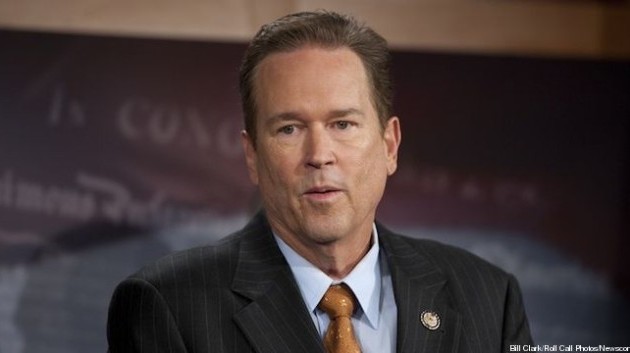Is Rep. Vern Buchanan (FL-16) Sugar Coating his Vote for the Ryan-Murray Budget deal?
I sent an email to Congressman Vern Buchanan (FL District 16) regarding his vote in favor of the Ryan-Murray Budget. I received a reply and decided to analyze what Rep. Buchanan said in his letter. This is important because Rep. Buchanan sits on the House Ways and Means Committee and is co-Chair of the Florida Congressional Delegation. Both are key positions in developing fiscal and spending policies at the federal level.
Here is a point by point analysis of Rep. Buchanan’s reply using a variety of resources including the Washington Post, Heritage Foundation and Breitbart:
Dear Dr. Swier:
Thank you for contacting me about the federal budget that passed the Congress last week. Although far from perfect, this agreement is a positive step toward restoring fiscal responsibility to Washington.
ANALYSIS – RESTORING FISCAL RESPONSIBILITY: WaPO, ‘The total deal is $85 billion. About $45 billion of that replaces sequestration cuts in 2014. About $20 billion replaces sequestration cuts in 2015. About $20 billion is deficit reduction atop sequestration.” Heritage, “[T]he deal increases spending immediately while delaying deficit reduction until later and trades some spending cuts for more revenue.” Breitbart, “The Bipartisan Budget Act (BBA) of 2013 would increase the discretionary spending caps established by the 2011 Budget Control Act (BCA) by $45 billion in 2014 and $18 billion in 2015,” the opening paragraph of the analysis reads. “The $63 billion in higher spending is not offset over the BCA window of 2014–2021; during that period, the legislation increases spending by almost $25 billion, as 53% of the offsets in the BBA realized during the BCA window come from higher fees and revenues.'”
The budget reduces the deficit and cuts spending by eliminating waste, stripping corporate welfare and trimming benefits for federal employees. And it does this all without raising taxes.
ANALYSIS – ELIMINATING WASTE, STRIPPING CORPORATE WELFARE AND TRIMMING BENEFITS OF FEDERAL EMPLOYEES: WaPO, “The new policies in the deal are split between revenue through fees — travelers will see higher prices on airline tickets and federal workers will have to contribute more to pensions — and spending cuts.” Heritage, “The budget deal ends a cost-shared partnership called the Ultra-Deepwater and Unconventional Natural Gas and Other Petroleum Resources Research Program, which researches ultra-deepwater architecture and unconventional drilling technologies. Ending the program is an important recognition that the federal government allocates billions of taxpayer dollars to activities that the private sector should be fully funding. Congress should go much further and remove all of these funding streams for all energy sources and technologies … The budget deal’s provision to improve the Pension Benefit Guaranty Corporation’s (PBGC) $36 billion deficit is a step in the right direction, but the allocation of increased premiums is misguided. The budget deal increases both the per-participant premium as well as the variable-rate premium assessed on plans’ unfunded liabilities. Increasing the per-participant premiums forces financially sound pension plans to pay for the financially unsound plans.” Breitbart, ” [T]his plan is not even really a budget since Ryan and Murray abandoned commitments to a budget conference—making the legislation actually just a spending bill.”
The agreement replaces some of the arbitrary cuts under sequestration with more targeted spending reductions, while achieving deficit reduction greater than under current law. The budget also preserved 92 percent of the original spending cuts required under sequestration.
Specifically, the budget deal includes some of the following provisions:
- Reduces the deficit by $23 billion without raising taxes.
- Reduces borrowing by $85 billion through a combination of mandatory savings and increased non-tax revenue.
- Repeals corporate welfare policies, saving taxpayers $8.1 billion.
- Ends the special carve-out for student-loan servicers saving taxpayers $3 billion.
ANALYSIS – ACHIEVING DEFICIT REDUCTION AND INCREASING NON-TAX REVENUE: WaPo, “Spending will be $45 billion higher in 2014 than it would’ve been absent the deal. The deal replaces about half of sequestration’s cuts to defense and non-defense discretionary spending in 2014. It replaces about a fourth of them in 2015. That means most of sequestration will go into effect in both years.” Heritage, “Under Title VI section 601, the proposal calls for an increase in aviation passenger security fees. This fee increase would take the current amount from $2.50 per passenger to $5.60. Unlike the original fee, this increase is not being used to fund or improve security. Instead, the revenue collected is being proposed to replace automatic spending cuts set to begin in January. The revenue, however, will not be directly distributed to the Transportation Security Administration (TSA); instead it will be deposited annually into a general fund of the Treasury. This increase is yet another way that the Administration and Congress are using the travel industries as an open pocketbook.” Breitbart, “Much of the spending increase in this deal has been justified by increased fees and new revenue. In other words: it’s a fee increase to fuel a spending increase—rather than reducing deficits. Disappointingly, CBO’s analysis states that $47 billion out of the $85 billion in offsets occur outside the original BCA window, and the spending cut portion of those outyear offsets are of dubious validity. It is not disputable that net spending in the BCA window is increased.”
Although far from perfect, this agreement is a positive step toward restoring fiscal responsibility to Washington.
Again, thank you for contacting me. If you want to receive congressional updates on this issue click here.
Sincerely,
![]()
Member of Congress
RELATED VIDEO:
RELATED COLUMNS:
Booze, Pole Dancing, and Luxurious Hotels: Top 10 Examples of Government Waste in 2013
The 13 Tax Increases of 2013 – Gird Your Loins, more coming in 2014!
2014 begins with $54 billion in tax hikes


